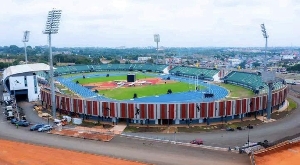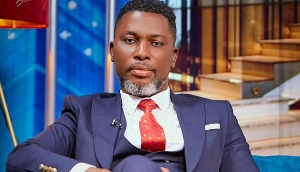- Home - News
- TWI News | TV
- Polls
- Year In Review
- News Archive
- Crime & Punishment
- Politics
- Regional
- Editorial
- Health
- Ghanaians Abroad
- Tabloid
- Africa
- Religion
- Election 2020
- Coronavirus
- News Videos | TV
- Photo Archives
- News Headlines
- Press Release
General News of Wednesday, 25 July 2007
Source: The Chronicle
Konadu Agyemang Leaves P. V. Cold
The DN Magasinet, a Norwegian newspaper on April 21, 2007, published a sensational account of Mr. PV Obeng’s role in a case in which an official of Scancem (owners of Ghacem) alleged in a Norwegian court that Mr. and Mrs. Rawlings had benefited from a secret account into which substantial sums had been paid by the company as part of a ploy to maintain its monopoly in the cement industry in parts of Africa.
The Rawlingses have since gotten their lawyers to issue a strong rebuttal to the charges but P.V. Obeng’s confirmation of having received monies from the Norwegian firm which he says were payments of services rendered, raises huge questions of unimaginable conflict of interest situation at the time.
ASKER AND BAERUM COURT
The case going on in Asker and Baerum court in Norway since October, raises a case of theft over which the new owners of Scancem, Heidleberger had dragged a former official of the company to court. The official before the court was stationed in Africa representing a Ghacem and scancem interests.How a foreign company bribed its way to the highest levels in Africa emerges from the court proceedings and unfortunately, some very familiar Ghanaian names are highlighted in uncomplimentary ways as principal players. Ghacem, operating in Tema and Takoradi, was the sole manufacturer of cement in Ghana. GHACEM is owned by SCANCEM and until 1999, it was owned by Norwegian investors. Since the 1960s, Scancem has controlled cement production in Ghana, Liberia, Togo, Tanzania, Congo, Sierra Leone, Niger and Gabon often as a monopoly.
Something else has started emerging that connotes “black money”- bribery to African leaders to protect Scancem’s (in the case of Ghana, GHACEM’s) monopoly status. From the magazine’s investigative report – Gray Cement- Black Money, the there is a discussion of bribery at the highest levels in Ghana, Togo and Nigeria. Togo’s former President, Gnassigbé Eyadema is dead and so cannot defend himself. Perhaps Ghana’s former President, Jerry John Rawlings, his wife and his one time “second in-command” referred to variously in the article as Vice President/Premier/Presidential Adviser), Mr. Paul Victor (PV) Obeng, are left holding the can.
THE ACCOUNTS AND THE MONIES From the court proceedings we read: “Scancem’s accounts contain vouchers that tell their own story. In the mid 1990s, there were two anonymous bank accounts in Unibank SA in Luxembourg and Barclays Bank SA in Geneva, Switzerland that were earmarked for Ghana. Considerable sums were paid in dollars from Scancem’s headquarters in Oslo.
From 1993 to 1998, a total of US $1,690,000 was transferred to the account in Barclays Bank. A total of US $2,460,000 dollars was paid into the Unibank account during the same period. Who received the monies? Scancem’s management at the time believed the Barclays money, as intended, went to President Rawlings’ wife, Nana Rawlings, and that the Unibank money went to “Vice President” Paul Victor Obeng”
Perhaps Scancem’s man based in Accra, who certainly would be a courier for these payments can help us and during his testimony, Tor Nygarrd said: “It is clear that bribery was behind it all. We paid politicians, the party and the port authorities. Because the payments were of a sensitive nature for the recipients, a special coded form was developed in Ghana for those who had received the money. The form was entitled “Special Payments.” Each recipient had his own number code. The form operates with a total of 14 such codes. The individual payments for each individual recipient are specified with the date and amount in Ghanaian cedi and American dollars” And yet another official, Per G. Jacobsen, Scancem’s former finance chief said of the bribery in Ghana and Africa: “Cash was a practical way of doing it.”
Tor Nygard was the Ghacem Managing Director at the time and consorted with sleazy former sexy dancer and now Queen mother of Aburi, Tamara Botsio, who used to assault Tor’s wife during drunken orgies in the early 90s. The court commented on the problems of evidence as follows; “It is part of the nature of the culture of bribery that it will not be possible to trace this, either by the tax authorities or by those for whom those receiving the money are acting or working. As such it is impossible to provide proof by the party handing over the money in cash that the money actually has been handed over.”
Did anyone try to contact any of the people alleged to have received the considerable payments by Scancem in Ghana to remove any unjustified cloud? Yes. Let us listen to some exchanges with PV Obeng as reported in “Gray Cement -Black Money” MANAGING DIRECTOR In 1998, then Managing Director of Scancem, Cato Holmsen in his own inquiry, talked to PV on the phone and “Obeng confirmed that the money had been paid as agreed.” On March 23, 2007, the authors of the document tried to interview PV in Ghana and he clung to his mobile phone and told them, “This is not an interview -I have answered the questions in writing!”
PV was asked what he did for the millions he received from Scancem in the 1990s. He responded: “I supplied them with information on the prevailing framework conditions at any given time for running a business, and updated them on political changes relating to the government.” With specific reference to the court case in Norway regarding allegation of corruption and bribery, Mr. Obeng said: “I am aware of this court case, but because this is an ongoing case, I must therefore decline to comment. I hope you understand my position. The new owner of Scancem, the Heidelberg Group of Germany, has appealed to the Norwegian court decision.
THE RAWLINGSES DENY CHARGES
In strong rebuttal yesterday, Mrs. Rawlings gave testimony that neither she nor her husband knew of any bribe and had not been contacted by any party about any allegation. Accra lawyer Mr. Tony Lithur acting as counsel for the former first couple, firmly issued a rebuttal to the story that had been published by the Statesman which was then posted on the worldwide web. That left Mr. P.V.Obeng in the slammer because he admitted to the Norwegian newspaper that he had received money for consultancy services. He, in his position then as Secretary of the Committtee of Secretaries and a Government official had broken all known rules of Governance because no Government official is permitted to engage in business for profit unless he makes full disclosure to his employers. With his employers denying knowledge of it, PV stands accused and will find it difficult to acquit himself of these charges. He still owns properties in the airport area and Ridge, acquired though Norwegian interests, (Ghacem). He is currently a proud recipient of the order of the Volta. He is also a board member of Ghana Investment Promotion Council.
THE RAWLINGS’ LAWYERS WROTE TO THE STATESMAN
PV OBENG ADMITS BUT CALLS IT CONSULTANCY"
To the best of our clients’ knowledge no Norwegian Court has made any findings that either Former President Rawlings or his wife, Nana Konadu Agyeman Rawlings, took bribe from anybody. What you describe as the findings of the court were actually pieces of evidence given by a gentleman called Gerhard Heiburg.To the best of our clients’ knowledge, the findings made by the Norwegian Court were to the effect that it was difficult making any findings, in circumstances that were described by Gerhard Heiburg, that indeed the monies that were allegedly paid were indeed paid to and received by the recipients named by him. It was the newspaper that drew the conclusion that Mrs. Rawlings was the beneficiary of slush monies from Scancem. Your story, deliberately perhaps, failed to give a full background that led to the conclusions drawn by the Norwegian Newspaper. Ownership of Scancem, manufacturers of cement, changed hands a few years ago. The new owners were concerned about the disbursement of certain funds by its previous directors in Africa towards consolidating their foothold in various markets in the region.
To put it bluntly, these were bribe monies. The new owners took the view, after undertaking a thorough internal investigation, that contrary to what they thought, the monies, or at least, substantial portions thereof, did not get to the intended recipients but had been stolen by Tor Egil Khelsaas, who was at the material time the Director in charge of Africa, and the one directly responsible for the disbursements.
They therefore initiated a case against Tor Egil Khelsaas. It was in a bid to explain away what he did with the monies that evidence was given on behalf of Tor Egil Khelsaas by Gerhard Heiburg, mentioning names of persons that they alleged the monies had been paid to. Gerhard Heiburg was also implicated in the allegation of theft. It should be pointed out that none of the persons mentioned by Gerhard Heiburg appeared in court to deny or corroborate the evidence of Gerhard Heiburg. In the case of our clients, they were not even aware of the case until the Norwegian publication came out.
HEIBURG’S CLAIMS
The rebuttal continued : It was in these circumstances that the court took the view that the nature of the operations described by Gerhard Heiburg made it difficult for any findings to be made to the effect that indeed those monies had been given to and received by the recipients. That was the only reason why Tor Egil Khelsaas was let off the hook. Indeed it would have been an incredible feat of judicial reasoning for any court, particularly one situate in Europe, to have made findings of bribery against a former head of state and his wife without hearing any word from them and without their involvement whatsoever in the case. It may interest you to now that the new owners have appealed against the judgment of the court of first instance, and that the matter is coming on for hearing on or about September 9, 2007.It would appear that it was from the evidence of Gerhard Heiburg that the Norwegian newspaper decided to conduct their own investigations and then drew the conclusions that you have boldly quoted in your publication. We have also noted from your publication that Mr. P. V. Obeng was interviewed by the Norwegian newspaper. Strangely, though, the same courtesy was not extended to our clients, whom one might think would have been the real "scoop".
In specific response to your publication, we have our clients’ instructions to state as follows: To the best of their knowledge, no Norwegian court has made any findings to the effect that they had received any bribes from Scancem; They are unaware of any secret account anywhere and indeed would welcome any information on the details of the accounts. Our clients had never at any time asked for or received any monies whether directly or indirectly from Scancem in order to further their corporate objectives.
Former President Rawlings would like to state that the underlying yardsticks that informed the June 4, 1979 uprising that brought him to power, were integrity, dislike for corruption and the desire to improve the welfare of the ordinary Ghanaian. Those yardsticks were his guide throughout his almost two decades in power. He still lives by them. It would have been sheer betrayal of those who sacrificed their lives for the attainment of those goals for him to turn round and take bribe from anybody while in office. He would not have demeaned himself and what he stood for to that extent.
The Former President says further that he has had occasion to throw a challenge to the present government and to the world intelligence community to unearth any bank account that they may discover belonging to him into which he has paid stolen money. To date, he has not received any response. The truth is that there is none. He would like to throw the same challenge to them and Transparency International (regarding the so-called secret accounts that are being mentioned in your publication in connection with him and his family), to conduct a thorough investigation if only to prove that they have at last got something against him. He would only ask for one indulgence: that they should make their findings public.
The unfolding case brings to mind the case of unjust enrichment levelled against P.V. Obeng by Publisher of The Chronicle group of newspapers, Nana Kofi Coomson, in 1996. When CHRAJ investigated Mr. P. V. Obeng in that case, for unjust enrichment, Nana Kofi Coomson appeared before Emile Short and Angelina Domakyeerah the CHRAJ Commissioner and his deputy and levelled the charges against the influential government official.
A Government white paper whitewashed the final report. Kofi recalls that his lawyers, Mr. Joe Ghartey then a junior at Nana Akufo Addo’s chambers, declined to lead him to finish the case, leaving him to turn to another junior at the same chambers, Yonni Kulendi. At the eleventh hour, Akufo Addo influenced Kulendi to pull out of the case, because P.V. Obeng, Coomson gathered independently, had gone to see Mr. Kojo Tsikata, then in charge of national security, for the latter to exploit his friendship with Nana Addo to pull his boy off the case.
Kulendi then pulled out, leaving Kofi at the eleventh hour to turn to former Deputy Minister, Nkrabeah Effah Dartey, to represent Coomson at the CHRAJ enquiries. The Chronicle at the time had published pictures of properties owned by P.V. Obeng including a hotel at the airport and restaurant, la chaumerie, which he owned with his wife.










